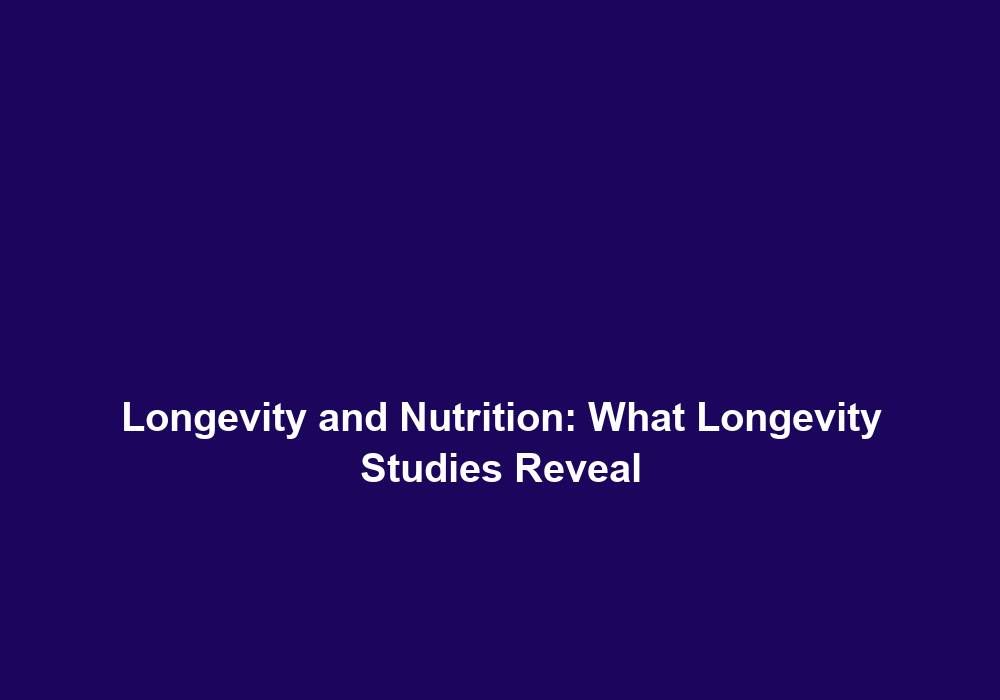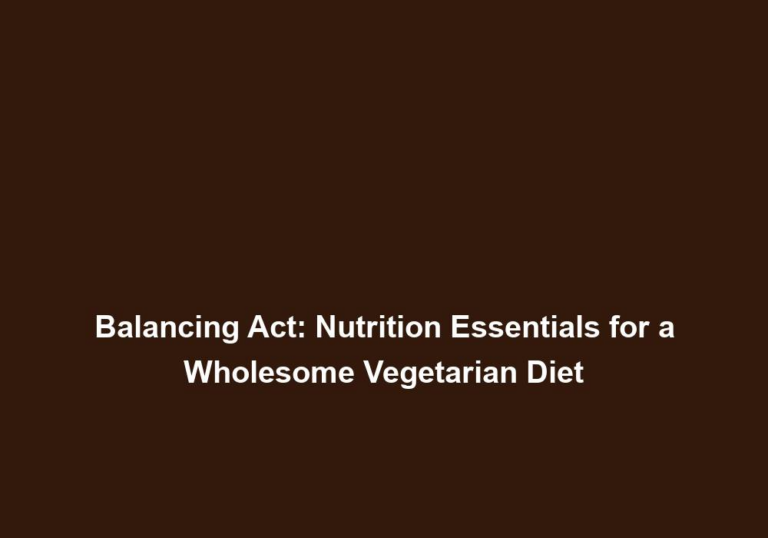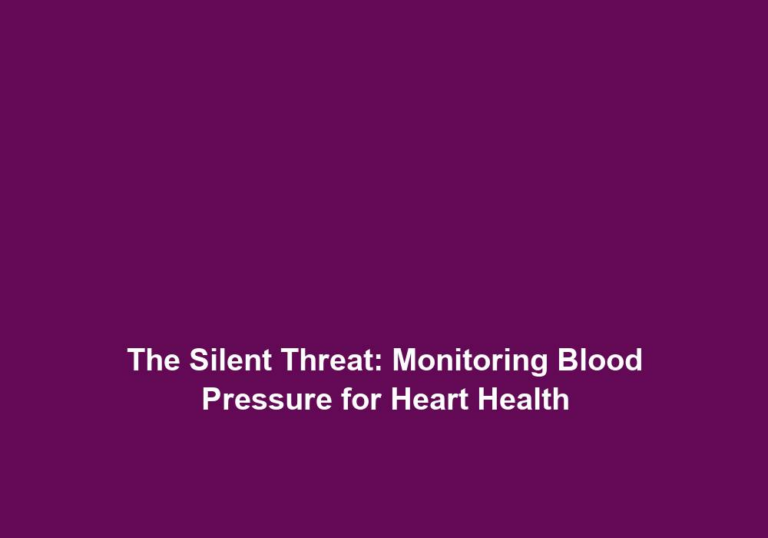Longevity and Nutrition: What Longevity Studies Reveal
In recent years, there has been a growing interest in longevity and the factors that contribute to a longer and healthier life. One factor that has gained significant attention is nutrition. Scientific research has provided valuable insights into the relationship between nutrition and longevity, highlighting the importance of a healthy and balanced diet in promoting longevity. In this article, we will explore the findings of various longevity studies and delve into the key components of a longevity-promoting diet.
The Link Between Nutrition and Longevity
Numerous studies have shown a strong association between nutrition and longevity, consistently suggesting that the type and quality of food we consume play a vital role in determining our lifespan and overall health. A well-balanced diet that includes a variety of nutrient-dense foods can provide the necessary fuel for our bodies to function optimally and ward off age-related diseases.
Benefits of a Well-Balanced Diet
- Provides essential nutrients: A well-balanced diet ensures that our bodies receive all the necessary vitamins, minerals, and macronutrients for proper functioning and maintenance.
- Supports immune function: Proper nutrition strengthens the immune system, helping to protect against infections and diseases.
- Promotes healthy weight management: A balanced diet helps maintain a healthy weight, reducing the risk of obesity and related health issues.
- Enhances cognitive function: Nutrient-rich foods support brain health and memory, reducing the risk of cognitive decline.
- Reduces inflammation: Certain foods have anti-inflammatory properties, which can help prevent chronic inflammation and associated diseases.
- Supports healthy aging: The nutrients in a well-balanced diet contribute to healthy cell regeneration and tissue repair, promoting longevity.
Key Components of a Longevity-Promoting Diet
To maximize the potential benefits of nutrition on longevity, it is important to focus on specific dietary components. Let’s explore some of the key components that have been shown to positively impact longevity:
1. Plant-Based Foods
Longevity studies consistently highlight the importance of plant-based foods in promoting a longer and healthier life. A diet rich in fruits, vegetables, whole grains, legumes, nuts, and seeds provides a wide array of essential nutrients, antioxidants, and phytochemicals. These compounds help protect against chronic diseases, such as heart disease, diabetes, and certain types of cancer.
Benefits of Plant-Based Foods
- High in fiber: Plant-based foods are rich in dietary fiber, which supports digestive health, promotes satiety, and helps regulate blood sugar levels.
- Packed with antioxidants: Fruits and vegetables are abundant in antioxidants, which neutralize free radicals and reduce oxidative stress.
- Provides essential vitamins and minerals: Plant-based foods are excellent sources of vitamins, minerals, and phytonutrients essential for overall health and disease prevention.
- Low in saturated fats: Plant-based diets are naturally low in saturated fats, which can help reduce the risk of cardiovascular diseases.
- Anti-inflammatory properties: Many plant-based foods have anti-inflammatory properties, contributing to a lower risk of chronic inflammation and associated diseases.
2. Healthy Fats
While it is essential to limit the intake of unhealthy fats, including trans fats and saturated fats, incorporating healthy fats into your diet is crucial for longevity. Foods rich in omega-3 fatty acids, such as fatty fish (salmon, sardines, and mackerel), avocados, and nuts, have been associated with a reduced risk of heart disease and improved brain health.
Benefits of Healthy Fats
- Heart health: Omega-3 fatty acids found in fatty fish and certain plant-based sources help lower blood pressure, reduce triglyceride levels, and decrease the risk of heart disease.
- Brain health: Omega-3 fatty acids are essential for brain development and function, promoting cognitive health and reducing the risk of age-related cognitive decline.
- Anti-inflammatory properties: Healthy fats have anti-inflammatory effects, which can help prevent chronic inflammation and associated diseases.
- Absorption of fat-soluble vitamins: Healthy fats aid in the absorption of fat-soluble vitamins, such as vitamins A, D, E, and K.
3. Antioxidant-Rich Foods
Antioxidants are substances that protect our cells from damage caused by harmful molecules called free radicals. Including antioxidant-rich foods in your diet can help combat oxidative stress and inflammation, which are closely linked to aging and age-related diseases. Berries, dark chocolate, green tea, and colorful vegetables are excellent sources of antioxidants.
Benefits of Antioxidant-Rich Foods
- Cellular protection: Antioxidants neutralize free radicals, preventing cellular damage and reducing the risk of chronic diseases.
- Anti-aging effects: Antioxidant-rich foods help slow down the aging process by preserving cellular integrity and reducing oxidative stress.
- Immune support: The immune-boosting properties of antioxidants strengthen the body’s defense against infections and diseases.
- Skin health: Antioxidants promote healthy skin by protecting against UV damage and reducing the appearance of wrinkles and fine lines.
4. Caloric Restriction
Studies conducted on various organisms, including mice and monkeys, have shown that caloric restriction without malnutrition can extend lifespan. Although the direct applicability to humans is not yet fully understood, reducing caloric intake while maintaining adequate nutrition may offer potential longevity benefits. It is essential to consult with a healthcare professional before considering any caloric restriction regimes.
Benefits of Caloric Restriction
- Slows down aging: Caloric restriction has been found to slow down cellular aging and delay the onset of age-related diseases.
- Improves metabolic health: Restricting calorie intake can improve insulin sensitivity, reduce inflammation, and enhance metabolic function.
- Enhances cellular repair mechanisms: Caloric restriction triggers cellular repair processes, leading to improved cellular and tissue health.
- Increases lifespan in certain organisms: Studies on animals have demonstrated an increase in lifespan with caloric restriction, though further research is needed to determine its effects on humans.
5. Mediterranean Diet
The Mediterranean diet has gained significant recognition for its potential in promoting longevity. This eating pattern emphasizes whole foods, such as fruits, vegetables, whole grains, legumes, and lean proteins, while limiting processed foods, red meat, and added sugars. Numerous studies have linked the Mediterranean diet with a reduced risk of heart disease, cognitive decline, and overall mortality.
Benefits of the Mediterranean Diet
- Heart health: The Mediterranean diet is rich in heart-healthy foods, such as olive oil, fish, whole grains, and nuts, which can help lower the risk of cardiovascular diseases.
- Cognitive function: The combination of healthy fats, antioxidants, and nutrient-dense foods in the Mediterranean diet supports brain health and reduces the risk of cognitive decline.
- Weight management: The Mediterranean diet emphasizes whole, unprocessed foods, which can aid in weight management and reduce the risk of obesity.
- Anti-inflammatory effects: The Mediterranean diet’s emphasis on fruits, vegetables, and healthy fats contributes to its anti-inflammatory properties, protecting against chronic inflammation and associated diseases.
6. Hydration
Proper hydration is often overlooked but is essential for overall health and longevity. Drinking an adequate amount of water throughout the day supports digestion, nutrient absorption, and maintenance of bodily functions. Staying hydrated can help prevent dehydration-related complications and promote optimal cell function.
Benefits of Hydration
- Optimal bodily function: Water is essential for the proper functioning of all bodily systems, including digestion, circulation, and temperature regulation.
- Nutrient absorption: Sufficient hydration supports the absorption of nutrients from food, allowing the body to utilize them effectively.
- Detoxification: Water aids in the elimination of waste products and toxins from the body, promoting overall detoxification and organ health.
- Skin health: Proper hydration helps maintain skin elasticity, moisture, and a healthy complexion.
The Role of Supplementation
While obtaining nutrients from whole foods is ideal, certain populations may benefit from dietary supplements. Individuals with specific nutrient deficiencies or those with dietary restrictions may find it challenging to obtain adequate levels of certain vitamins and minerals solely through food. In such cases, targeted supplementation under the guidance of a healthcare professional can help meet the body’s nutritional needs.
Benefits of Dietary Supplements
- Filling nutrient gaps: Supplements can help bridge nutritional gaps and ensure the body receives the necessary vitamins, minerals, and other essential nutrients.
- Addressing specific deficiencies: Supplements can be used to address specific nutrient deficiencies identified through blood tests or medical evaluations.
- Supporting overall health: Certain supplements, such as omega-3 fatty acids or probiotics, can provide additional health benefits beyond what can be obtained from food alone.
- Enhancing nutrient absorption: Some supplements, such as vitamin D, can aid in the absorption of certain nutrients, maximizing their effectiveness.
Conclusion
Longevity studies consistently emphasize the significant impact of nutrition on our lifespan and overall health. A well-balanced diet rich in plant-based foods, healthy fats, antioxidants, and essential nutrients can help promote longevity and reduce the risk of age-related diseases. Incorporating the principles of a Mediterranean diet, practicing caloric restriction (with caution), and ensuring proper hydration are valuable strategies to enhance longevity. It is important to remember that individual needs may vary, and consulting with a healthcare professional or registered dietitian is recommended to tailor an optimal nutrition plan for your specific circumstances.
Note: This article is for informational purposes only and should not replace professional medical advice.







